Unit 3 The world meets China Developing ideas Reading 课件 (共28张PPT)2024-2025学年高二英语外研版(2019)选择性必修4
文档属性
| 名称 | Unit 3 The world meets China Developing ideas Reading 课件 (共28张PPT)2024-2025学年高二英语外研版(2019)选择性必修4 | 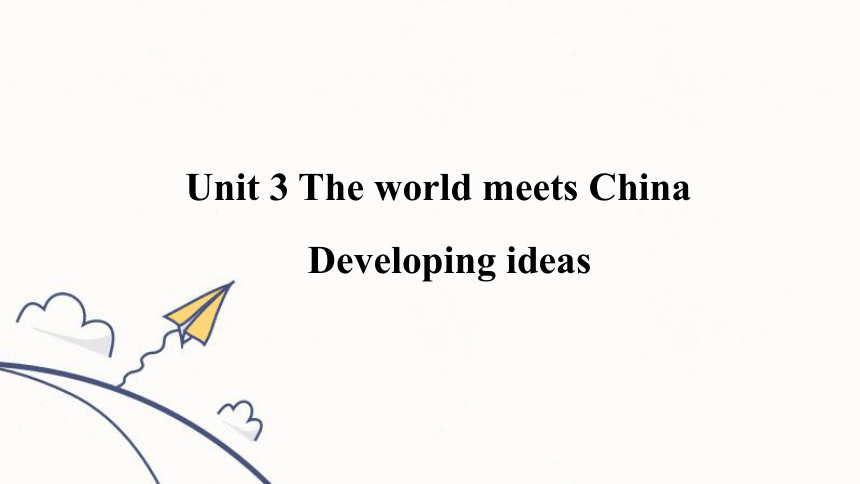 | |
| 格式 | pptx | ||
| 文件大小 | 6.2MB | ||
| 资源类型 | 教案 | ||
| 版本资源 | 外研版(2019) | ||
| 科目 | 英语 | ||
| 更新时间 | 2025-04-23 08:58:30 | ||
图片预览

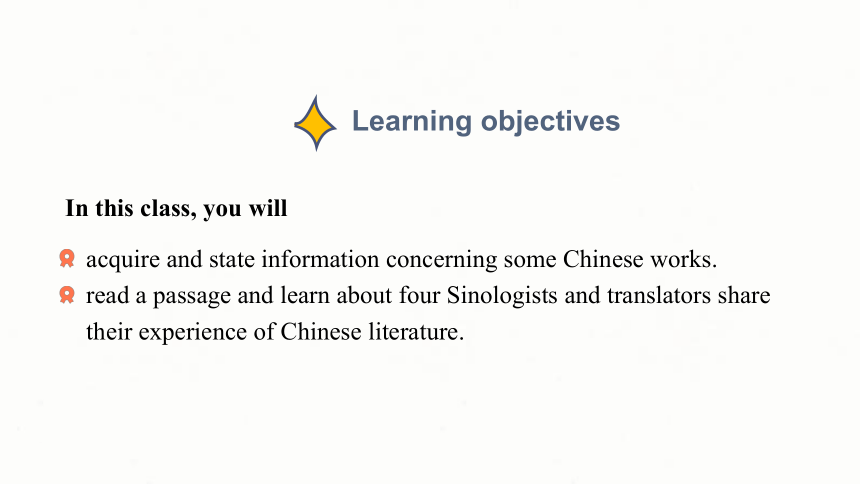
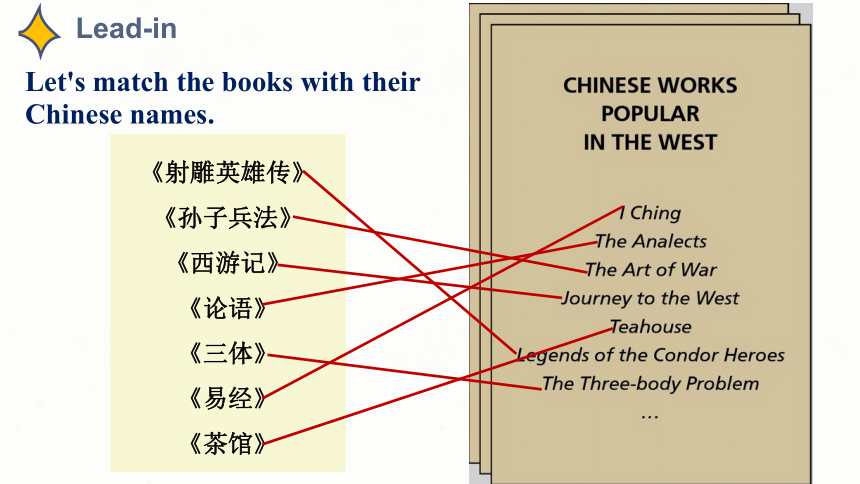


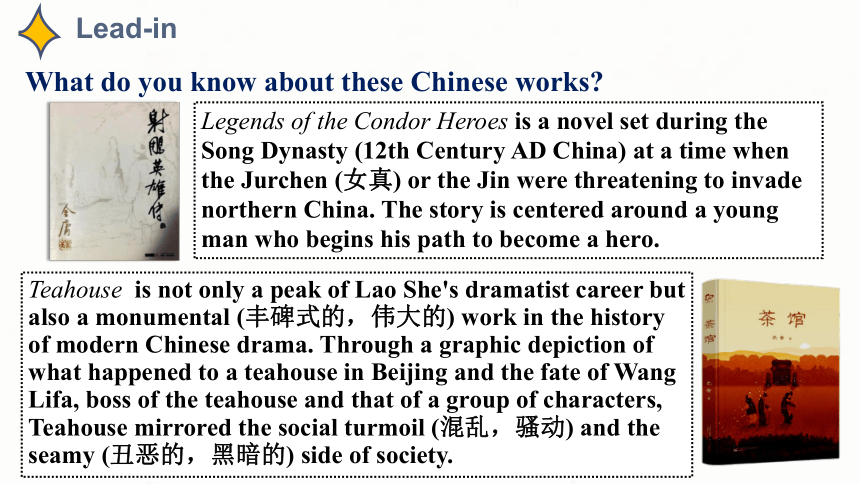
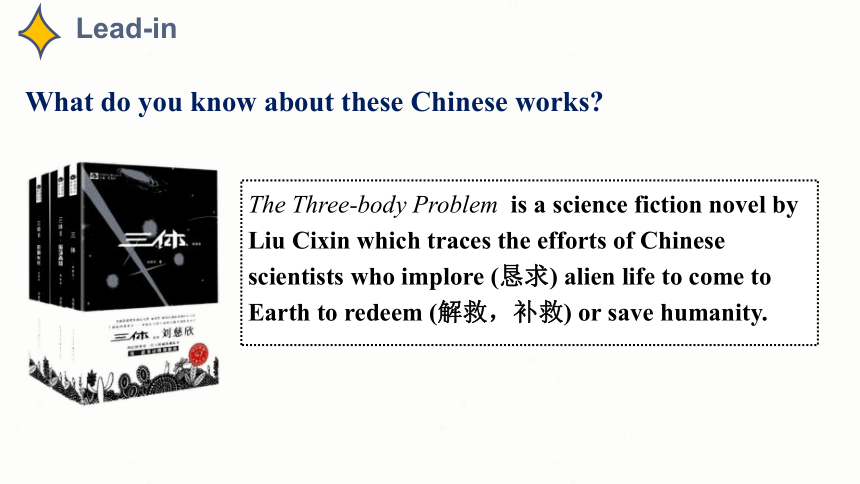
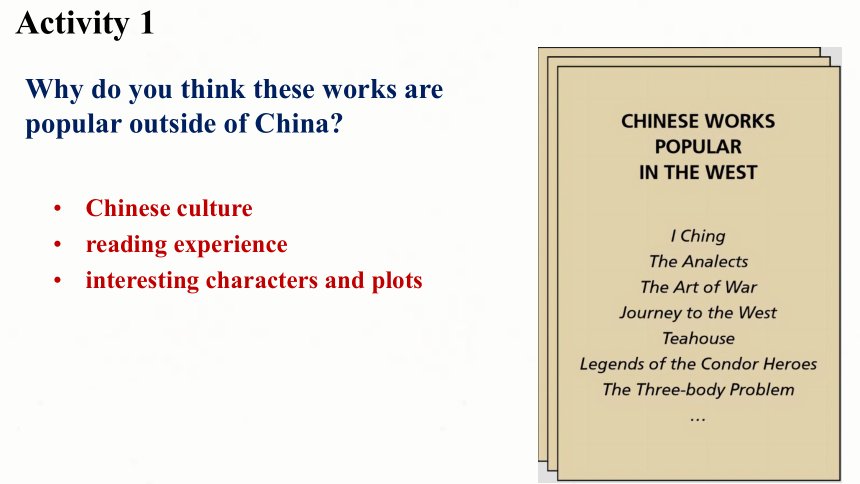
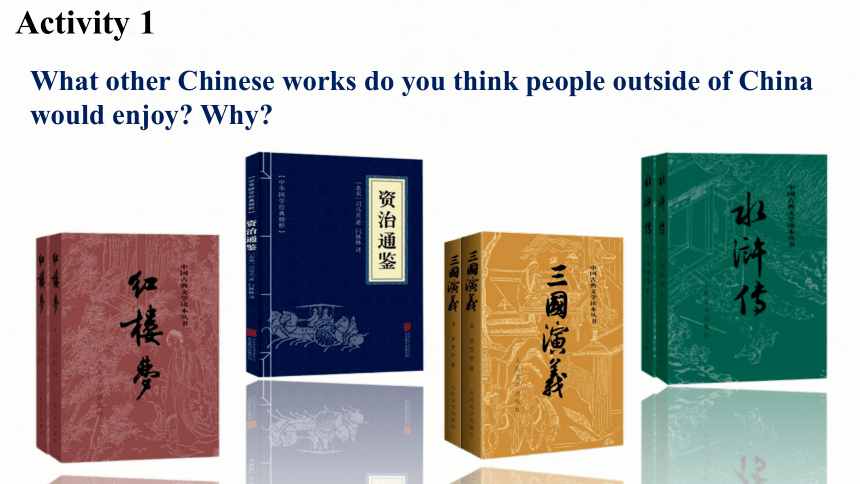
文档简介
(共28张PPT)
Unit 3 The world meets China
Developing ideas
In this class, you will
acquire and state information concerning some Chinese works.
read a passage and learn about four Sinologists and translators share their experience of Chinese literature.
Learning objectives
Let's match the books with their Chinese names.
《射雕英雄传》
《孙子兵法》
《西游记》
《论语》
《三体》
《易经》
《茶馆》
Lead-in
What do you know about these Chinese works
I Ching or "Book of Changes", a common source for both Confucianist and Taoist philosophy, is one of the first efforts of the human mind to place itself within the universe.
The Analects are a collection of the teachings and thoughts of Confucius; they also contain fragments (片段) of dialogues between the great Chinese philosopher and his followers.
Lead-in
What do you know about these Chinese works
The Art of War is an ancient Chinese military treatise (专著) dating from the Late Spring and Autumn Period (roughly 5th century BC). The book contains a detailed explanation and analysis of Chinese military, from weapons, environmental conditions, and strategy to rank and discipline.
Journey to the West is about the adventures of monk Xuanzang, one of China's most famous religious heroes, and his four supernatural disciples (信徒), in search of Buddhist scriptures (经文).
Lead-in
What do you know about these Chinese works
Legends of the Condor Heroes is a novel set during the Song Dynasty (12th Century AD China) at a time when the Jurchen (女真) or the Jin were threatening to invade northern China. The story is centered around a young man who begins his path to become a hero.
Teahouse is not only a peak of Lao She's dramatist career but also a monumental (丰碑式的,伟大的) work in the history of modern Chinese drama. Through a graphic depiction of what happened to a teahouse in Beijing and the fate of Wang Lifa, boss of the teahouse and that of a group of characters, Teahouse mirrored the social turmoil (混乱,骚动) and the seamy (丑恶的,黑暗的) side of society.
Lead-in
What do you know about these Chinese works
The Three-body Problem is a science fiction novel by Liu Cixin which traces the efforts of Chinese scientists who implore (恳求) alien life to come to Earth to redeem (解救,补救) or save humanity.
Lead-in
Activity 1
Why do you think these works are popular outside of China
Chinese culture
reading experience
interesting characters and plots
Activity 1
What other Chinese works do you think people outside of China would enjoy Why
We are going to read a passage of an interview on four Sinologists and translators sharing their experience of Chinese literature with us.
A person who studies or is an expert in sinology (= Chinese language, literature, history, society, etc.)
Activity 2 (Read and write)
Write the following questions on the lines in the passage.
1. Which works by Chinese writers are popular in your country
2. How did you get interested in Chinese literature
3. How do you select works to translate
2. How did you get interested in Chinese literature
3. How do you select works to translate
1. Which works by Chinese writers are popular in your country
Activity 3 (Read and match)
Match people to their opinions. Find evidence to support your choices.
a. Studying Chinese language was what first got me interested in its culture. If only there was greater awareness of Chinese language and literature in my country.
b. I feel that my culture has a lot in common with Chinese culture. I care more about what writers have to say than who they are.
c. I wish that people could learn to love Chinese culture as much as I do especially stories from classical literature.
d. It’s important to read what interests you, not just what is recommended by other people. The same goes for the literature that I translate.
1. Petko
Activity 3 (Read and match)
Match people to their opinions. Find evidence to support your choices.
a. Studying Chinese language was what first got me interested in its culture. If only there was greater awareness of Chinese language and literature in my country.
b. I feel that my culture has a lot in common with Chinese culture. I care more about what writers have to say than who they are.
c. I wish that people could learn to love Chinese culture as much as I do especially stories from classical literature.
d. It’s important to read what interests you, not just what is recommended by other people. The same goes for the literature that I translate.
2. Annelous
Activity 3 (Read and match)
Match people to their opinions. Find evidence to support your choices.
a. Studying Chinese language was what first got me interested in its culture. If only there was greater awareness of Chinese language and literature in my country.
b. I feel that my culture has a lot in common with Chinese culture. I care more about what writers have to say than who they are.
c. I wish that people could learn to love Chinese culture as much as I do especially stories from classical literature.
d. It’s important to read what interests you, not just what is recommended by other people. The same goes for the literature that I translate.
3. Joachim
Activity 3 (Read and match)
Match people to their opinions. Find evidence to support your choices.
a. Studying Chinese language was what first got me interested in its culture. If only there was greater awareness of Chinese language and literature in my country.
b. I feel that my culture has a lot in common with Chinese culture. I care more about what writers have to say than who they are.
c. I wish that people could learn to love Chinese culture as much as I do especially stories from classical literature.
d. It’s important to read what interests you, not just what is recommended by other people. The same goes for the literature that I translate.
4. Mai
Activity 4 (Think and share)
1. If you had a chance to talk with the four Sinologists, what would you like to ask them
2. Which works of Western literature are popular in China What make them popular
3. In what different ways do the two reading passages in this unit improve your understanding of China’s influence on the world
Activity 5 (Read and discuss)
1. What work would you recommend as an introduction to Chinese literature Why
Type/Content/Reasons
Language support:
classical/ancient/modern Chinese literature; works from ... dynasties
learn about/reflect(s) Chinese culture and everyday life in China
reflects human nature and experience
Nobel Prize in Literature
Tips
I would recommend Teahouse, a masterpiece of modern Chinese literature by Lao She, which brings together over sixty characters, reflecting Chinese culture and everyday life in China. The play not only provides a detailed picture of Chinese history and culture but also reflects human nature, which manages to strike a chord with people of all walks of life. That’s why I think people outside of China would enjoy reading it.
Activity 5 (Read and discuss)
1. What work would you recommend as an introduction to Chinese literature Why
When faced with answering one big question, start by breaking it down into a series of smaller questions. Then consider how many of these questions you can answer and what evidence you can give to support these answers. Finally identify what you still need to find out and how you will go about this.
Learning to learn
Activity 5 (Read and discuss)
2. Discuss how to promote Chinese literature throughout the world.
2. Discuss how to promote Chinese literature throughout the world.
Break the topic into smaller questions.
Types Methods Content
1
2
3
4 ... ... ...
fiction
drama
poetry
translation
film adaption
advertising
everyday life
culture/history
supernatural fantasy
Activity 5 (Read and discuss)
Do research to find more information to support your ideas.
Present your ideas to the class.
Now think about what effective measures you have taken to give an answer to a big question.
2. Discuss how to promote Chinese literature throughout the world.
Activity 5 (Read and discuss)
Unit 3 The world meets China
Language points P42-44
1. When I started high school, I began reading books about Chinese history and culture, and this inspired me to choose Chinese Studies as my academic major at university.
句意:当我开始读高中的时候,我开始阅读关于中国历史和文化的书籍,这启发了我在大学选择了中国研究作为我的学术专业。
when引导时间状语从句
and连接两个并列的句子
⑴
⑵
句子结构分析
2. His writing had a profound effect on me, and I have this to thank for my passion for Chinese literature.
句意:他的作品对我产生了深远的影响,我要感谢这一点,让我对中国文学充满热情。
The traffic laws don’t take effect until the end of the year.
交通法要到年底才生效。
The new law will come into effect next month.
新的法律下个月生效。
My warning was of no effect.
我的警告无济于事。
生效;奏效
生效;实行
无效的;无用的
对……有影响
3. The people that buy and read these books do so
because they want to learn more about Chinese culture and everyday life in China.
that引导定语从句
because引导原因状语从句
句意:购买和阅读这些书的人就是这样做的, 因为他们想更多地了解中国文化和中国的日常生活。
句子结构分析
4. Literature has a lot of significance to the French, and Chinese literary works tend to be highly thought of.
句意:文学对法国人来说意义重大,而中国文学作品往往受到高度重视。
The boss seems to think highly of you.
老板似乎很器重你。
They don’t know that people in some places think nothing of staring at others on the street.
他们不知道有些地方的人并不觉得在街上盯着他人看有什 么不妥。
对……评价高;器重;看重
不把……当回事;认为不算什么
The young designer is _______(high) thought of in the company.
All those who know him _____________________ (对……评价高) him.
Mo Yan is a famous Chinese writer, whose writings are ________________ (评价很高).
【语法填空】
think much/ well of 对……评价高;器重,看重
be highly/well/much thought of 被高度评价
think little/ill/poorly/badly of 认为……不好
speak highly of 对……评价高
speak well/ill of 说……的好话/坏话
think nothing of 不把……当回事;认为不算什么
highly
think/speak highly of
highly thought of
Unit 3 The world meets China
Developing ideas
In this class, you will
acquire and state information concerning some Chinese works.
read a passage and learn about four Sinologists and translators share their experience of Chinese literature.
Learning objectives
Let's match the books with their Chinese names.
《射雕英雄传》
《孙子兵法》
《西游记》
《论语》
《三体》
《易经》
《茶馆》
Lead-in
What do you know about these Chinese works
I Ching or "Book of Changes", a common source for both Confucianist and Taoist philosophy, is one of the first efforts of the human mind to place itself within the universe.
The Analects are a collection of the teachings and thoughts of Confucius; they also contain fragments (片段) of dialogues between the great Chinese philosopher and his followers.
Lead-in
What do you know about these Chinese works
The Art of War is an ancient Chinese military treatise (专著) dating from the Late Spring and Autumn Period (roughly 5th century BC). The book contains a detailed explanation and analysis of Chinese military, from weapons, environmental conditions, and strategy to rank and discipline.
Journey to the West is about the adventures of monk Xuanzang, one of China's most famous religious heroes, and his four supernatural disciples (信徒), in search of Buddhist scriptures (经文).
Lead-in
What do you know about these Chinese works
Legends of the Condor Heroes is a novel set during the Song Dynasty (12th Century AD China) at a time when the Jurchen (女真) or the Jin were threatening to invade northern China. The story is centered around a young man who begins his path to become a hero.
Teahouse is not only a peak of Lao She's dramatist career but also a monumental (丰碑式的,伟大的) work in the history of modern Chinese drama. Through a graphic depiction of what happened to a teahouse in Beijing and the fate of Wang Lifa, boss of the teahouse and that of a group of characters, Teahouse mirrored the social turmoil (混乱,骚动) and the seamy (丑恶的,黑暗的) side of society.
Lead-in
What do you know about these Chinese works
The Three-body Problem is a science fiction novel by Liu Cixin which traces the efforts of Chinese scientists who implore (恳求) alien life to come to Earth to redeem (解救,补救) or save humanity.
Lead-in
Activity 1
Why do you think these works are popular outside of China
Chinese culture
reading experience
interesting characters and plots
Activity 1
What other Chinese works do you think people outside of China would enjoy Why
We are going to read a passage of an interview on four Sinologists and translators sharing their experience of Chinese literature with us.
A person who studies or is an expert in sinology (= Chinese language, literature, history, society, etc.)
Activity 2 (Read and write)
Write the following questions on the lines in the passage.
1. Which works by Chinese writers are popular in your country
2. How did you get interested in Chinese literature
3. How do you select works to translate
2. How did you get interested in Chinese literature
3. How do you select works to translate
1. Which works by Chinese writers are popular in your country
Activity 3 (Read and match)
Match people to their opinions. Find evidence to support your choices.
a. Studying Chinese language was what first got me interested in its culture. If only there was greater awareness of Chinese language and literature in my country.
b. I feel that my culture has a lot in common with Chinese culture. I care more about what writers have to say than who they are.
c. I wish that people could learn to love Chinese culture as much as I do especially stories from classical literature.
d. It’s important to read what interests you, not just what is recommended by other people. The same goes for the literature that I translate.
1. Petko
Activity 3 (Read and match)
Match people to their opinions. Find evidence to support your choices.
a. Studying Chinese language was what first got me interested in its culture. If only there was greater awareness of Chinese language and literature in my country.
b. I feel that my culture has a lot in common with Chinese culture. I care more about what writers have to say than who they are.
c. I wish that people could learn to love Chinese culture as much as I do especially stories from classical literature.
d. It’s important to read what interests you, not just what is recommended by other people. The same goes for the literature that I translate.
2. Annelous
Activity 3 (Read and match)
Match people to their opinions. Find evidence to support your choices.
a. Studying Chinese language was what first got me interested in its culture. If only there was greater awareness of Chinese language and literature in my country.
b. I feel that my culture has a lot in common with Chinese culture. I care more about what writers have to say than who they are.
c. I wish that people could learn to love Chinese culture as much as I do especially stories from classical literature.
d. It’s important to read what interests you, not just what is recommended by other people. The same goes for the literature that I translate.
3. Joachim
Activity 3 (Read and match)
Match people to their opinions. Find evidence to support your choices.
a. Studying Chinese language was what first got me interested in its culture. If only there was greater awareness of Chinese language and literature in my country.
b. I feel that my culture has a lot in common with Chinese culture. I care more about what writers have to say than who they are.
c. I wish that people could learn to love Chinese culture as much as I do especially stories from classical literature.
d. It’s important to read what interests you, not just what is recommended by other people. The same goes for the literature that I translate.
4. Mai
Activity 4 (Think and share)
1. If you had a chance to talk with the four Sinologists, what would you like to ask them
2. Which works of Western literature are popular in China What make them popular
3. In what different ways do the two reading passages in this unit improve your understanding of China’s influence on the world
Activity 5 (Read and discuss)
1. What work would you recommend as an introduction to Chinese literature Why
Type/Content/Reasons
Language support:
classical/ancient/modern Chinese literature; works from ... dynasties
learn about/reflect(s) Chinese culture and everyday life in China
reflects human nature and experience
Nobel Prize in Literature
Tips
I would recommend Teahouse, a masterpiece of modern Chinese literature by Lao She, which brings together over sixty characters, reflecting Chinese culture and everyday life in China. The play not only provides a detailed picture of Chinese history and culture but also reflects human nature, which manages to strike a chord with people of all walks of life. That’s why I think people outside of China would enjoy reading it.
Activity 5 (Read and discuss)
1. What work would you recommend as an introduction to Chinese literature Why
When faced with answering one big question, start by breaking it down into a series of smaller questions. Then consider how many of these questions you can answer and what evidence you can give to support these answers. Finally identify what you still need to find out and how you will go about this.
Learning to learn
Activity 5 (Read and discuss)
2. Discuss how to promote Chinese literature throughout the world.
2. Discuss how to promote Chinese literature throughout the world.
Break the topic into smaller questions.
Types Methods Content
1
2
3
4 ... ... ...
fiction
drama
poetry
translation
film adaption
advertising
everyday life
culture/history
supernatural fantasy
Activity 5 (Read and discuss)
Do research to find more information to support your ideas.
Present your ideas to the class.
Now think about what effective measures you have taken to give an answer to a big question.
2. Discuss how to promote Chinese literature throughout the world.
Activity 5 (Read and discuss)
Unit 3 The world meets China
Language points P42-44
1. When I started high school, I began reading books about Chinese history and culture, and this inspired me to choose Chinese Studies as my academic major at university.
句意:当我开始读高中的时候,我开始阅读关于中国历史和文化的书籍,这启发了我在大学选择了中国研究作为我的学术专业。
when引导时间状语从句
and连接两个并列的句子
⑴
⑵
句子结构分析
2. His writing had a profound effect on me, and I have this to thank for my passion for Chinese literature.
句意:他的作品对我产生了深远的影响,我要感谢这一点,让我对中国文学充满热情。
The traffic laws don’t take effect until the end of the year.
交通法要到年底才生效。
The new law will come into effect next month.
新的法律下个月生效。
My warning was of no effect.
我的警告无济于事。
生效;奏效
生效;实行
无效的;无用的
对……有影响
3. The people that buy and read these books do so
because they want to learn more about Chinese culture and everyday life in China.
that引导定语从句
because引导原因状语从句
句意:购买和阅读这些书的人就是这样做的, 因为他们想更多地了解中国文化和中国的日常生活。
句子结构分析
4. Literature has a lot of significance to the French, and Chinese literary works tend to be highly thought of.
句意:文学对法国人来说意义重大,而中国文学作品往往受到高度重视。
The boss seems to think highly of you.
老板似乎很器重你。
They don’t know that people in some places think nothing of staring at others on the street.
他们不知道有些地方的人并不觉得在街上盯着他人看有什 么不妥。
对……评价高;器重;看重
不把……当回事;认为不算什么
The young designer is _______(high) thought of in the company.
All those who know him _____________________ (对……评价高) him.
Mo Yan is a famous Chinese writer, whose writings are ________________ (评价很高).
【语法填空】
think much/ well of 对……评价高;器重,看重
be highly/well/much thought of 被高度评价
think little/ill/poorly/badly of 认为……不好
speak highly of 对……评价高
speak well/ill of 说……的好话/坏话
think nothing of 不把……当回事;认为不算什么
highly
think/speak highly of
highly thought of
